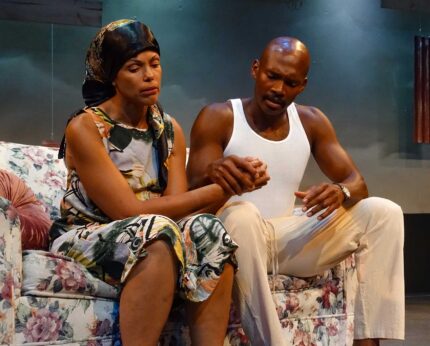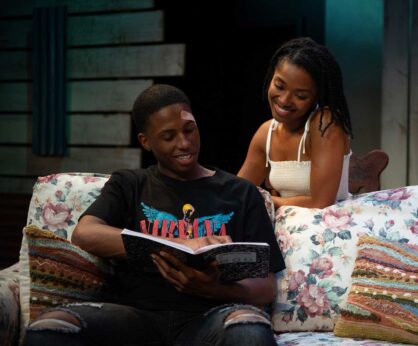
LOS ANGELES — “I wanted to capture the heart of a young artist trying to figure out where he fits in,” playwright JuCoby Johnson explains. “These characters each have a deep love for one another that they’re trying and failing to communicate. It’s often difficult and scary to share our love, even with the people we’re closest to.”
Johnson’s protagonist (a stand-in for the author?) is Jahaan (Donté Ashon Green), attending an arts magnet high school with a white student body—no sports teams—and finding ways to express himself primarily through the sensitive, confessionary poetry he writes and recites. In short, though every story is always nuanced with its own particulars, it’s essentially a coming-of-age tale.
How It’s Gon’ Be received its world premiere in May 2019 in an Underdog Theatre production at Minneapolis’s Mixed Blood Theatre to critical acclaim. Ahmed Best, whom we last encountered in Hooded, or Being Black for Dummies, directs Echo Theater Company’s West Coast premiere.
The cast of six features Jahaan’s two parents and three close peers (two young men, one young woman) all on the cusp of adulthood. Jahaan’s poem that asks, “Do you love me?” and then hovers in confusion when no one responds, forms the centerpiece of the play. All the characters sooner or later, one way or another, struggle with the same issues. Do you love? Do I? How come it’s so hard to ask for it or to admit it? In the case of the three youngsters on the verge of manhood, they’re still experimenting with their own gender preference in a hateful world.
“You out here chasin’ manhood, but manhood gon’ find you first.”

We meet our cast during the last days of summer vacation. The boys are escaping to the basketball courts for their final practice and pickup games before school starts again. The usual banter that ribs Jahaan for his artsy “gay” education fills the air. It’s the day when Jahaan’s father Kenny (Sedale Threatt Jr.) returns after a year away on military assignment, awaiting his next tour of duty. That’s the deal Kenny and his wife Angela (Karla Mosley) made years back—that for the long-term value of a retirement, secure pension, and benefits, Kenny would enter the service even if it meant long stretches apart. Angela is one of those “tough love” Black mamas the theater can’t seem to live without, a woman whom life has handed a raw deal and who dishes out her frustration to anyone and everyone in striking distance. The other female character in the play is Lady (Nona Johnson), a lovely, sensual teenage woman on the rebound from her last affair and now showing her hands-on interest in the kind-hearted, poetic Jahaan.
The world has paused on its axis for this brief moment in time as love in its various forms hangs heavy in the air, strained relationships are stretched to the breaking point, and lines of authority are drawn in the sand. How It’s Gon’ Be is a slice of one Black boy’s life during the summer he becomes a man—and an artist.
His two buds are the swaggering, blustering, fatherless Rashad (Michael Howard–Dossett) and his gentler, softer sidekick Terry (Durran Moreau). All of Johnson’s characters are loosely based on his own childhood and strongly rooted in reality.
Not all is tied up in a neat bow by the end of the second act, for the playwright surely knows that little in life is ever fully, permanently resolved. Our gaze is squarely on these few hot, muggy days of summer, and there is no mileage to be gained by focusing on the outcome. It’s in the process that we see “how it’s gon’ be.”

The sense of place, as well as of specific time in the play, is for this critic unsettling, if we are to believe that the character of a part of the country, or a city, impacts its citizens, and the year or period in which it happens. I surmise the playwright sets his scene in the Black suburbs of Boston as there’s reference to the Fenway and I-95, but the city’s turbulent racial history goes unremarked upon, not to mention its centrality to both the American Revolution and the intellectual currents that dominated American thinking through a good part of the 19th century. We know there’s a family cookout with fireworks, which suggests the Fourth of July, but it could be Labor Day. Well, successful plays have not always attached themselves to a sense of place or time; I guess I’m saying that personally, I felt the absence.
Still, those are relatively minor concerns that maybe not everyone will need answers to. The acting is stupendous and the direction, with all its quick scene changes on a humble stage and running exits and entrances, is witty and fine-tuned. Best and most of all, Johnson’s script is itself the all-embracing entity spread generously over his cast of characters, full of lyricism and light and yes, tough love.
The Echo creative team includes scenic designer Amanda Knehans; lighting designer Justin Huen; sound designer Alysha Grace Bermudez; co-costume designers Ann Closs-Farley and Sophia Grose; graphics designer Christopher Komuro; and casting director Tal Fox. The production stage manager is Jenny Park.
How It’s Gon’ Be plays on Fri. and Sat. at 8 p.m., Sun. at 4 p.m., and Mon. at 8 p.m. through Oct. 23. All Mon. night performances are pay-what-you-want. Atwater Village Theatre is located at 3269 Casitas Ave. in Los Angeles 90039. Parking is free in the Atwater Crossing (AXT) lot one block south of the theater. For more information and to purchase tickets, call (310) 307-3753 or go to www.EchoTheaterCompany.com.












Comments